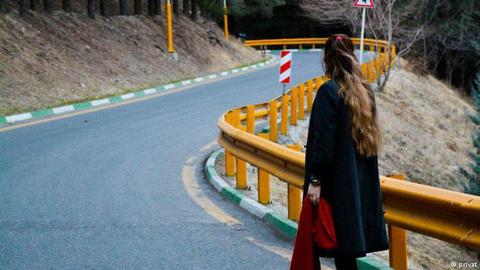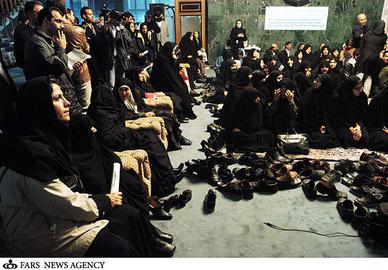Most discriminatory laws against Iranian women were passed in the early years following the 1979 Islamic Revolution. The new Islamic Republic authorities sought to replace laws they had inherited from the monarchy with new legislation that would reflect the entire body of “Islamic principles.”
The first three Islamic parliaments, from 1980 to 1992, made wholesale changes in the country’s civil laws and passed new laws, including an Islamic Penal Code that in many cases specifically targeted women, aiming to adjust their lives and their lifestyles to correspond with the new government requirements and the worldview of the extremist clergy.
Part of the “Islamization” of the society was entrusted to the members of the parliament, but when the process of legislation proved to be time-consuming, the Islamic Revolution Council took over, or the directives of Ayatollah Khomeini, as the founder of the Islamic Republic, became the rule.
This is the second of IranWire's reports about the laws passed by the Islamic Republic’s parliament regarding women and, also, the role played by woman representatives in the parliament. For this purpose, we have divided parliaments into three periods.
The first, second and third parliaments that followed the revolution passed the highest number of anti-women laws. The fourth, fifth and sixth parliaments, from 1992 to 1996, and the tenth, elected in 2016, tried to improve some discriminatory laws against women — but the same parliaments also passed some discriminatory and repressive laws as well. The seventh, eighth and ninth parliaments, from 2005 to 2016, returned to the extremist post-revolutionary positions.
The fourth, fifth and sixth parliaments (1992-2004), as well as the tenth parliament (2016-present), were different from the first three but, in the end, they accomplished relatively little in counteracting the discriminatory legislation of previous parliaments.
The fourth, fifth and the sixth parliament passed, respectively, 31, 31 and 24 pieces of legislation about women, family and children. Below we review these laws under the headings of punishments, social freedoms, family, education and employment.
In the fifth parliament (1996-2000), the formation of a Women, Youth and Family Affairs Committee could have been a turning point in pursuing legislation to mitigate discrimination against women. But a review of legislation passed by this parliament shows that the committee played no significant role. In the last year of the fifth parliament, the committee was dissolved and its functions were passed on to the Committee on Culture. Since then, only the Women’s Caucus in the parliament has pursued issues related to women.
When the sixth parliament (2000-2004) approved the United Nations Convention on the Elimination of All Forms of Discrimination Against Women, it encountered stiff opposition. A number of prominent clergymen opposed it and the Guardian Council, which must give any legislation its seal of approval before it becomes law, rejected it. But the sixth parliament persisted and asked the Expediency Council — responsible for resolving differences between the parliament and the Guardian Council — to take up the case. As yet the Expediency Council has not done so and the issue remains unresolved.
Punishments
In its last days, the fourth parliament amended Book Five of the Islamic Penal Code and added articles including:
- Article 619: “Anyone who assaults or disturbs children or women in public places or roads, or insults them with outrageous language and behaviors, shall be sentenced to two to six months’ imprisonment and up to 74 lashes.”
- Article 622: “Anyone who, knowingly and deliberately, batters or abuses a pregnant woman and causes her to miscarriage, in addition to retribution and payment of compensation, shall be sentenced to one to three years’ imprisonment.”
- Article 630: “When a man sees his wife committing adultery with another man, provided that he is certain that his wife is willing [to have sex], he can kill both of them; however if he knows that his wife is acting under coercion, he may only kill the man [i.e. her rapist]. The same rule applies to assault and battery.”
The fifth parliament continued gender discrimination with its Criminal Code of Procedure for Public and Revolutionary Courts, which declared that the testimony of two men is equal to the testimonies of one man and two women. In other words, the testimony of a woman in a court of law is only worth half of that of a man.
Social Freedoms
The fourth, fifth, sixth and tenth parliaments did not contribute much to social freedoms for women, but neither did they pass many laws restricting these freedoms. Nevertheless, they did pass some. One article in the law for “conforming procedures in healthcare facilities with the laws of the Holy Sharia,” passed by the fifth parliament, rules that “in cases of [medical] examinations related to women and childbirth when the presence of the opposite sex is necessary, a person related to the patient or a female member of the technical staff must be present.”
An amendment to Article 638 of the Islamic Penal Code, passed by the fourth parliament, increased the punishment for hijab violators: “Women who appear in public places and roads without wearing an Islamic hijab shall be sentenced to from between 10 days’ and two months’ imprisonment or a fine of between 50,000 and 500,000 rials.”
The Women’s Caucus of the current (tenth) parliament has a bill to change the Passport Law on its agenda. This law requires women to obtain permission from their “guardian” — a husband if a woman is married — to travel abroad. The law continues to create problems for sportswomen and women in arts, science and culture.
Women and Family
Among the four parliaments under review, the sixth passed the most legislation concerning the family.
The fourth parliament passed laws in support of marriage, including granting loans to university students who marry while they are still studying. This parliament also passed the law “to promote breastfeeding and to support mothers during breastfeeding.” The law ruled that public and private sectors must give breastfeeding mothers — up to and including their third child — four months of leave and emphasized the need for creating “facilities attached to the workplace for mothers to breastfeed babies.”
One interesting law passed by the fifth parliament was an amendment to Article 1082 of the Islamic Civil Code, ruling that mahriyeh — funds and assets the husband promises to the wife as part of a marriage contract — must be adjusted for inflation when the wife demands payment.
As part of a law on taxes, the sixth parliament allowed the Welfare Organization to issue permits for “women’s and girls’ health centers.” And, as part of the budget for 2000, it exempted women from paying five percent tax on their mahriyeh upon receiving it.
The sixth parliament also amended Article 1041 of the 1991 Civil Code, setting the age of marriage for females at 13 and males at 15, but retained the provision that allows underage marriage “by the permission of the guardian and on condition of taking into consideration the ward’s interests.”
The same parliament added a provision to Article 1130 of the Civil Code regarding reasons to allow women to file for divorce: Abandonment of the family by the husband for six months continuously or for nine months recurrently without an acceptable reason, a husband’s addiction, a prison sentence handed down to the husband for five years or more, beating of and violence against the wife, and suffering from incurable or contagious diseases.
By amending Article 1107 of the Civil Code, the sixth parliament expanded the “cost of maintenance” that the husband must pay to his wife by including health expenses. By amending Article 1133 — “A man can divorce his wife whenever he wishes to do so” — it permitted women, under certain conditions, to ask the court for a divorce. Article 1169 on the custody of children was also amended. Earlier, based on a law passed in 1935, divorced women could keep the custody of daughters until the age of seven but had to give the custody of the son to his father when the child reached the age of two. With the changes, women’s custody rights of sons were extended to the age of seven as well.
The sixth parliament also legalized “donations” of fetuses to infertile couples provided sharia rules are respected. It also passed a comprehensive law for social security that addressed issues such as children without families and supporting women during pregnancy.
The tenth parliament has passed a motion on “granting citizenship to the children of Iranian mothers.” This motion is now being reviewed by various parliamentary committees. This parliament has also motions under review for increasing the age of marriage for girls from 13 to 15.
Education
Unlike the first three parliaments after the 1979 Islamic Revolution, the fourth, fifth, sixth and tenth did not pass many laws regarding women’s education, but they tried to restore some rights that had been taken away by the first three parliaments. The fourth parliament passed the law for the allocation of a quota for women to study for assistantships in specific specialized medical fields.
The fourth parliament also passed or amended laws to facilitate the entrance of women and children from families serving in the military and the paramilitary Basijis into universities and institutes of higher education.
The fifth parliament passed no legislation on women’s education, but the sixth parliament revoked Article 3 of the 1985 law that prohibited unmarried women from going abroad to continue education at universities. It also amended the law governing the Supreme Council of Education and specified that “at least one person” in the three sub-councils that make up the council — “knowledgeable individuals and experts,” “members of the faculties in the specialized areas at universities and research centers” and “representatives of teachers or school principals” — must be a woman.
The sixth parliament made sexual discrimination illegal when it came to selecting students for all universities, public or private, at any level.
Employment
As in previous parliaments, the fourth parliament exempted certain groups from the “Law on the Service of Doctors and Paramedics.” This law requires medical doctors, dentists, pharmacologists and other professionals in the fields related to medicine to serve for five years in towns and areas that have no universities in these fields before they can receive a permanent license to practice. The parliament extended the exemption to the families of war martyrs, of those who had been maimed in the war and of those missing in action, in addition to mothers who are sole guardians of their children.
Under Islamic Republic, women cannot be judges and the fourth parliament, in an amendment to the Law on Choosing Judges, reiterated this discrimination but ruled that women who have the necessary qualifications for being judges can be chosen for various positions such as advisor at the Court of Administrative Justice, special civil courts, working for centers of legal research and the Bureau of Minors’ Affairs and preparing bylaws for the justice system, as well as working for other organizations in the legal system.
In Article 20 of the Law on Police Employment Provisions, the fourth parliament ruled that police forces are allowed to hire women as employees when the job “requires it.” The law specified that, as much as possible, female employees should work in locations that accommodates the “employment situation” of their husbands.
The fourth parliament amended the 1975 Social Security Law by setting the retirement age of men at 50 and 45 for women. By attaching a provision to Article 76 of the same law, it allowed women to retire after 20 years of service at the age of 42 with a pension equal to 20 days of their salary.
In the “Law for Creating Employment Council,” the fifth parliament passed a provision that allows the president’s advisor in women and family affairs to participate in the proceedings of the council “as an observer and without the right to vote.” Also, the responsibility for planning to further the employment of “special groups” such as the disabled, women and the youth was given to the Employment Council.
The fifth parliament also passed a law that allows the police to hire women as police agents or employees “if needed,” provided “Islamic principles” are observed.
But the fifth parliament also passed the controversial law for “adapting the administrative and technical affairs of medical institutions to the principles of the Holy Sharia,” implicitly approving the separation of male and female patients, the separation of male and female medical staff and the enforcement of dress codes in medical facilities.
The tenth (current) parliament has passed a law that grants women with “special conditions” a reduction in working hours.
Other Laws
These four parliaments also passed other laws that relate to women. One involved cooperation with foreign countries that saw women with expertise in cultural, educational and scientific disciplines taking part in panel discussions abroad, and reciprocally, those partner countries sending female experts to take part in similar events in Iran.
The fifth parliament passed a law that allocated 2.5 percent of the tax on cigarettes to women’s sports activities and 12 percent to expanding sports arenas for women.
The sixth parliament approved an agreement between the Islamic Republic and Tunisia on cooperation in the areas of women and family.
The tenth parliament allocated 0.27 percent of the nine percent value-added tax (VAT) to expanding sports for women and the youth.
The tenth parliament has 17 woman representatives — more than any other parliament after the 1979 revolution. The Women’s Caucus has many motions and bills on its agenda, including one that bans violence against women. But this bill has encountered the opposition of institutions under the command of Ayatollah Khamenei and has a long way to go before it becomes law — if it does at all.
Related Coverage:
Iran’s Discriminatory Laws Against Women: The Early Days
Female Singers and an Underground Concert in Tehran, November 19, 2018
Do Women Need Permission from Men to go Mountain Hiking?, November 18, 2018
Dancing is Not a Crime, July 10, 2018
Is Khamenei Afraid to Contradict Grand Ayatollahs?, December 13, 2017
Ayatollah Gives Thumbs Down to Women in Stadiums, December 12, 2017
Only Married Women Allowed to Play Music, November 30, 2017
The Stage Is no Place for Iranian Women, December 21, 2016
, May 27, 2016
, April 3, 2016
Women and Travel Bans: Can the Laws be Reformed?, November 3, 2015
, September 23, 2015
Going out? Ask your Husband First, September 15, 2015
, June 15, 2015
Judicial Official Defends Polygamy, February 5, 2015
Iran’s Gender Double Standards, October 20, 2014
visit the accountability section
In this section of Iran Wire, you can contact the officials and launch your campaign for various problems


























comments